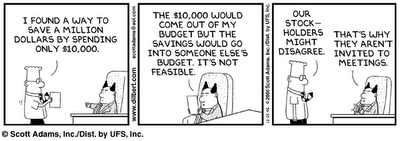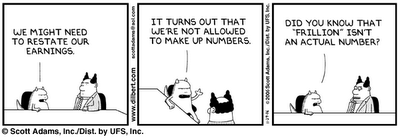Feliz Dia de Gracia.
I like the Spanish name for this holiday, because it shows this is a celebration of Grace, of Gratis. You can't feel Gratitude for something that you "earned". Gratitude is the sense of unmerited favor, of Gift, and every particle of the Universe, outside our money-mind system, runs on, by, and through Gratitude. Look into any wild creature's eyes and see its burning fire for yourself.
I'm all excited. Somebody left me a comment with this link: www.utterpants.co.uk/notpants/madmoney.html, which I just added to the link bar to the right.
It's a blog entry I've been wanting to write, and now I don't have to do it because this Michael Dickinson already did, and I couldn't have written it better! You gotta read it, and you'll see these ideas on money aren't my own hair-brain ideas or opinions, but a universal truth that another witness is tapping into.
.............................
A Message for Materialists/ScientistsNow I want to write from a "materialistic" viewpoint, this time not for folks who follow the religion of Evangelical Christianity, but for folks who follow the religion of science and materialism.
So you believe that we all came about by
chance, that the universe is a
hodge-
podge of random reactions. So you believe that Natural Selection brought us from an
amoeboid to a
rodentoid to an ape-
oid to a homo
sapiens. This is a fine and true religion. It is the result of simple observation, just as the ancient faiths are. And I maintain that if everybody in the world but believed (practiced) their own religion of simple observation, our world would fall back into balance with the rest of Nature, and we individuals would fall back into balance with our own natures. But let me point out that you most likely do not believe your own religion of science, just as most self-proclaimed Buddhists, Orthodox Christians, Mormons, Muslims, Hindus, Taoists, Sikhs, etc. do not believe their own religion.
Simply put, faith is abandoning yourself to chance. Chance is the random interactions of credit & debt, positive & negative, outside human mind control. If you believe Chance brought us from a dust particle to a human, brought us thus far, why do you now not trust Chance to carry us further??? Why can't we trust that balance will occur if we but give up consciousness of credit & debt, if we but give up control of balance of positive & negative? When has a negative charge ever NOT been naturally met by an equal and opposite positive charge? When has a death ever NOT been naturally met by an equal and opposite life? Why do we continue to not trust that a "bad" deed is naturally met by an equal and opposite "punishment"? Why can't we, who call ourselves scientists, trust our own science, like an infant, that "Vengeance belongs to Chance, Chance will repay", not to our minds that can't even balance a budget. Why can't we trust that Nature is perfectly Just. When have wave crests ever NOT been met by equal and opposite wave troughs? If Female were not met miraculously by an equal and opposite Male, then life would cease. A positive coincides with a negative. If Coincidence ceased, the Universe would cease. Why do we think Coincidence, called Miracle by the religious, is an exception, rather than The Rule?
The Money World Blocks EvolutionNow I'm going to say some seemingly hard things. But you know they are true. Money and possessions side-step chance, putting a block on Evolution, skirting around Natural Selection. We think we are avoiding Death by accumulating money and possessions, by stockpiling positives and squelching negatives. But all we are doing is building up our own demise. The negatives will come back on us in a tidal wave, to bring themselves back into Justice with the positives we've horded. Isn't this what the Koran keeps saying? Isn't this a theme of the Bible and the
Dao De
Jing? Isn't this basic science?
Why are we as a species nursing prolonged suffering from year to year, generation to generation, in the name of compassion, while Nature
abhors prolonged suffering, knocking it off in Just Natural Selection before it can even establish itself? Mutations are naturally balanced with Order in the Wild World. But they are
heaped up in massive imbalance in our Domestic World. And we pass them down, in ever larger masses, from generation to generation. Then people like Adolph Hitler arise and think they can re-establish the Balance, and they make it way worse. The
erroneously call it Social Darwinism - but Darwinism it is NOT. Darwinism is Natural Selection, not Human Mind-Control Selection. Darwinism is Faith in the Law of Nature, not faith in the laws of human mind-control.
Hunter-Gatherers Our ExampleI like how the
Inuits (Eskimos) of the past (and maybe still the present) lived in such balance with Nature, that when one became old and too lame to be happy, to contribute to the tribe, she would voluntarily go sit on an ice float cross-legged like the Buddha and wait for a polar bear to eat her up. Missionaries thought this barbaric and put an official end to the practice. Now the
Inuits are so happy with their booze and chronic illness and their oil money. When you read accounts of anthropologists who studied the
Inuits before Missionary money "saved" them, they are totally astounded how these tribes living in one of the harshest environments on earth could be so
constantly happy.
The
Kung (Bushmen) of the Kalahari, like the
Inuits, lived in another of the harshest environments on earth. The Kalahari doesn't even have regular surface water, and the
Kung only carried bows & arrows. The rumor among the civilized was that these Bushmen were poor souls continually suffering, slaving, scratching out a living from the harsh desert. Then anthropologists went in to study them, and were astounded. The
Kung were, in fact, the most studied of all hunting-and-gathering tribes. And anthropologists found that they only worked 2 to 3 hours a day, and the rest of the time they spent in
leisure. But even that is bogus, because I can testify that when you live without money, there is no distinction between work and play. Watch any wild animal and you'll know what I mean. Don't watch money-funded propaganda nature flicks on TV if you want an accurate view. Go out and see for yourself.
Slaves of Civilization are struggling and suffering, not for food, but to maintain possessions and fictional bank accounts and appearances. And such slaves can't imagine that life could be any other way, so they believe nature is cruel to justify their own cruelty against both themselves and others.
Yet, I Am Not a Primitivist!I am not really a
primitivist. Human inventions come from the same Creative Source as leaves and flowers and chimpanzees and electrons come. Do you know who invented the automobile, the television, the microchip, the rocket, the piano, the paintbrush, the wheel? Chances are you don't. But you know who got famous marketing each of those things and pushing them like drugs for profit, don't you? I had this realization once when I worked at a homeless shelter in Boulder, Colorado. One of the residents was an inventor of machine parts. Presently, he was working on a better sewing machine bobbin. He was doing it for the pure joy of creating - and you know he wasn't doing it for money or fame. The greatest works of art are in temples, done by the obscure for the obscure, simply for the pure joy of doing. Work and play and creation and reward and joy are all One in the Present Moment.
Last summer I talked with a Nepalese Buddhist in Portland, Oregon about these ideas on living moneyless. He got all excited and immediately started envisioning people building cars purely because they wanted to, making computers from a place of pure joy, building cities from instinctual creativity - all within a purely gift economy. Nobody owns anything and all things are shared. And everything balances out as in Nature, because our true selves are Nature. He had the look of a child as he
envisioned this "naive" world.
Naivete is our only salvation. All great things begin with the "impossible" vision. With faith all things are possible.
 HT: The Conglomerate Blog.
HT: The Conglomerate Blog.



















